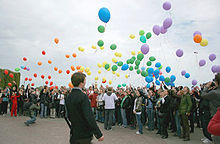
The history of lesbian, gay, bisexual and transgender people (LGBT) in Russia and its historical antecedents (the Soviet Union and the Russian Empire) has largely been influenced by the political leanings of its rulers. Medieval Catholic-Protestant Europe had the largest influence on Russian attitude towards homosexuality. Russian LGBT history was influenced by the ambivalent attitude of the Russian Orthodox religiosity regarding sexuality.
Under the reign of Peter the Great in the 18th century, who introduced a wide range of reforms aimed at modernizing and Westernizing Russia, male homosexual activity was banned only for soldiers in military statutes. In 1832, the criminal code included Article 995, which stated that "muzhelozhstvo", or men lying with men, was a criminal act punishable by exile to Siberia for up to five years. Men lying with men was interpreted by courts as meaning anal sex. Application of the laws was rare, and the turn of the century found a relaxation of these laws and a general growing of tolerance and visibility.
In the wake of the October Revolution, the Bolshevik government decriminalized homosexuality. The Bolsheviks rewrote the constitution and "produced two Criminal Codes – in 1922 and 1926 – and an article prohibiting homosexual sex was left off both."[1] The new Communist Party government removed the old laws regarding sexual relations, effectively legalising homosexual activity within Russia, although it remained illegal in other territories of the Soviet Union, and the homosexuals in Russia were still persecuted and sacked from their jobs.[1] Under Joseph Stalin, the Soviet Union recriminalized homosexuality in a decree signed in 1933.[2] The new Article 121, which punished "muzhelozhstvo" with imprisonment for up to five years, saw raids and arrests. Female homosexuals were sent to mental institutions. The decree was part of a broader campaign against "deviant" behavior and "Western degeneracy".[1] Following Stalin's death, there was a liberalisation of attitudes toward sexual issues in the Soviet Union, but homosexual acts remained illegal. Discrimination against LGBT individuals persisted in the Soviet era, and homosexuality was not officially declassified as a mental illness until 1999.[3]
Soviet Article 121 was often commonly used to extend prison sentences and to control dissidents. Among those imprisoned were the well-known film director Sergei Paradjanov and the poet Gennady Trifonov. Under Mikhail Gorbachev's administration in the late 1980s, the first gay organization came into being. The Moscow Gay & Lesbian Alliance was headed by Yevgeniya Debryanskaya and Roman Kalinin, who became the editor of the first officially registered gay newspaper, Tema. The fall of the USSR accelerated the progress of the gay movement in Russia. Gay publications and plays appeared. In 1993, a new Russian Criminal Code was signed, without Article 121. Men who had been imprisoned began to be released.
Since 2000, a campaign by Russian president Vladimir Putin and the Russian Orthodox Church to promote "traditional Russian values"[4] and oppose "liberalism" in regards to homosexuality has led to many pieces of anti-LGBT legislation being passed federally, including the banning of distribution of "propaganda of non-traditional sexual relationships to minors" in 2013,[5] an amendment in Russia's constitution banning same-sex marriage passed in 2020, and expansion of the 2013 propaganda law signed in 2022 to apply it to anyone, regardless of age.[6]
- ^ a b c "1917 Russian Revolution: The gay community's brief window of freedom". BBC. 2017. Retrieved 9 April 2019.
- ^ Morgan, Joe (17 June 2018). "The Secret Gay History of Russia". Gay Star News. Archived from the original on 20 November 2021. Retrieved 21 March 2021.
- ^ "1917 Russian Revolution: The gay community's brief window of freedom". BBC News. 10 November 2017. Retrieved 3 January 2023.
- ^ Wilkinson, Cai (3 July 2014). "Putting "Traditional Values" Into Practice: The Rise and Contestation of Anti-Homopropaganda Laws in Russia". Journal of Human Rights. 13 (3): 363–379. doi:10.1080/14754835.2014.919218. ISSN 1475-4835. S2CID 143746074.
- ^ Cite error: The named reference
guardian-passedwas invoked but never defined (see the help page). - ^ Chernova, Ivana Kottasová,Anna (5 December 2022). "Putin signs expanded anti-LGBTQ laws in Russia, in latest crackdown on rights". CNN. Retrieved 14 March 2023.
{{cite web}}: CS1 maint: multiple names: authors list (link)